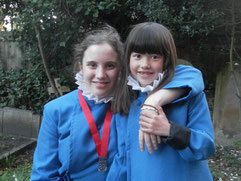Choristers
Probationers

When children first join the Choir, they are known as Probationers, and spend a term (sometimes longer, especially if they are younger) getting to know the routine of the Choir, and getting used to the services. Normally they will sing only a portion of the service until they have settled in. They receive specialist training in a small group as they learn the basics of choral singing.
Full Choristers

When the Director of Music feels they are ready, Probationers are 'made up' to full membership of the Choir in a short ceremony during Parish Eucharist, and presented with their surplice. From then on they are expected to commence the usual Choir routine, and be present at all services and rehearsals unless arranged in advance with the Director of Music.
When a treble demonstrates that they are reliable and professional, and after gaining enough experience, they are promoted to the Senior section. Seniors are expected to set the highest example to the Probationers and Juniors, and to lead the trebles.
Leadership roles

Three trebles also have further responsibilities: two team leaders and the Head Chorister.
The team leaders have responsibility for looking after their side of the choir stalls ('Dec' or 'Can'), and are tasked with collecting music after the services and sorting it ready for filing away by the Choir Librarian.
The Head Chorister is an experienced, committed member of the trebles who is responsible for assisting the Director of Music in looking after the Choir, looking after Probationers, keeping robes and music in order and making sure the trebles are neat and tidy before services.
Chorister Training Programme

The Choristers at St Mary’s follow the Royal School of Church Music’s (RSCM) Voice for Life scheme - a framework for chorister training whereby they work towards carefully graded levels. The awards, which the trebles work on during Friday rehearsals with our vocal coach and theory tutor, are a benchmark of high achievement and when a level is complete choristers are entitled to wear a medal and ribbon of the appropriate colour over their surplice.
The awards are taught in small groups and individually and include aspects of vocal technique, repertoire, music theory, and the role of the choir in worship.